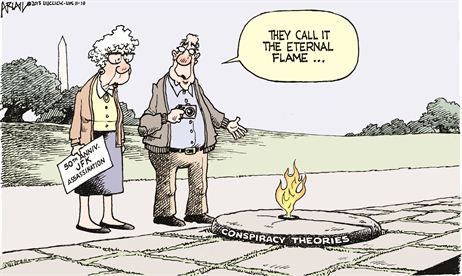It really can not be avoided this year, as the number of candles on the cake equal that milestone known as 50. The thing about conspiracy theories is that they not only fall apart under the slightest scrutiny, being based on nothing more than a bizarre stringing together of handpicked disparate, “facts,” but more often than not, some false assumptions are necessary and must be overlooked in order to continue the narrative. In the case of the Kennedy assassination, Texas Governor, John Connaly, not only had to have his seating position moved, but his orientation as well. Several physicists have conducted numerous experiments in which they were able to prove that Kennedy’s head would travel towards the shot after being struck by the caliber of ammunition used, but that has done nothing to deter the Zapruder Film from being used to some how bolster this nonsense. The claims have been made ad nauseam that no man could fire a bolt action rifle accurately 3 time in 5.6 seconds, even though the Warren Commission places the timing at slightly over 8 seconds, all of which is pointless. It is all pointless because our ever helpful Marine Corps has chimed in on several occasions, including in testimony to the Warren Commission that Oswald’s not nearly so super human feat did not even rise to the level of minimal qualifying capability for graduation from Marine Corp Boot Training, which is something that Oswald had actually accomplished. A second shooter from the grassy knoll has been claimed, and yet not one spent cartridge, nor a slug from that direction had ever been recovered, in what has to be the single most investigated criminal event in American History. As a matter of fact, no actual evidence has ever been presented which shows that anyone other than Lee Harvey Oswald committed this murder.
Oswald was not originally arrested for the Kennedy Murder, but his seemingly bizarre and without motivation murder of Dallas Police Officer J.D. Tippet. It was not until his questioning in relation to that murder that the pieces of the Kennedy Assassination were put together. For those of you, and you know who you are, who would out of hand dismiss the Warren Report, ask yourself honestly if you’ve even read it. If not, why would you dismiss it out of hand? Every piece of actual evidence that has ever been presented to any law enforcement authority points to one person and one person only. Even further than that however, this persistent need to reject that a man of such low standing, such as Oswald was, could have affected the life of a man of such high standing, as Kennedy was, is nothing more than a clinical psychosis. People need to feel secure in their Universe, and part of that security is the need to believe that great people seen as good, can only be harmed by equally great people seen as evil. The thought that a seeming nobody can take down our nationally elected leader represents the introduction of unwelcome chaos into the universe of those who need such security.
There were 9 forensic pathologists on the Warren Commission, and of those 9, total agreement was held by 9 of them. The angle of trajectory of all three shots, what each shot did, the final disposition of each shot. In 1986, a mock trial was held in England, based on American Law, in which Lee Harvey Oswald was tried for the Murder of John F. Kennedy, and done so as if Oswald had not been assassinated himself. The prosecutor of that case was none other than Vincent Bugliosi, the Los Angelos Assistant District Attorney who prosecuted Charles Manson and the first members of the Manson Family to be brought to justice. (It should be noted that since Manson’s conviction, 35 subsequent members of the Manson Family have been prosecuted and convicted of various murders in California, Nevada, and Arizona. Since the most recent of those occurred in this century, Bugliosi has not gotten them all.) After that conviction, Bugliosi wrote the book on his prosecution entitled, “Helter Skelter.” Since that time, he has published several true crime books, one of which was, “Reclaiming History,” which covered the Kennedy Assassination. His book is several thousand pages long, not because of any complications in the actual case, but because he addresses and debunks each and every publicly stated objection to the Warren Report.
It is a source of never ending amusement to me that the same people who have chosen not to trust the government’s investigation into this, 911, our moon landing, what have you, are the very same people who trust the government implicitly with respect to total and equitable wealth redistribution and our entire health care system. Literally, the mind reels. If you have hour and ten minutes to spare, Vincent Bugliosi, while he may be a tad long winded, is also a compelling and entertaining speaker. So O.K. conspiracy theorists, let me have it, but bear in mind that somebody somewhere has already debunked totally what you are about to say.





